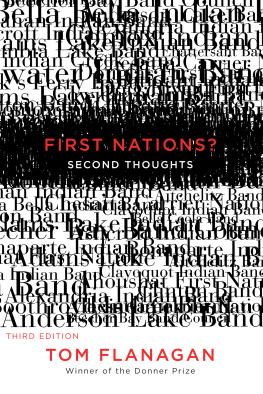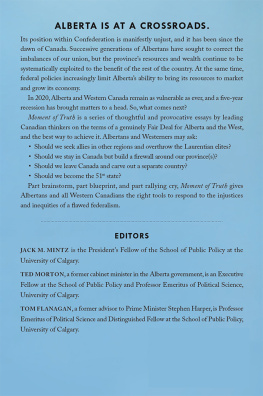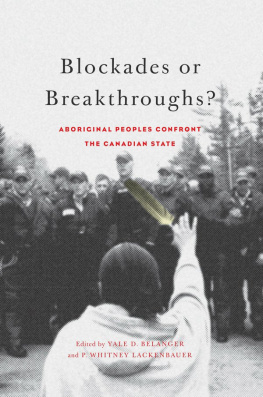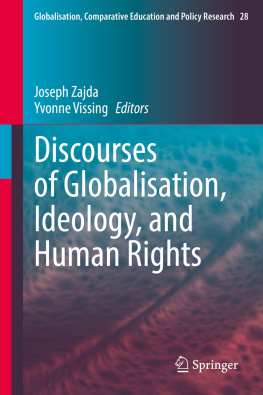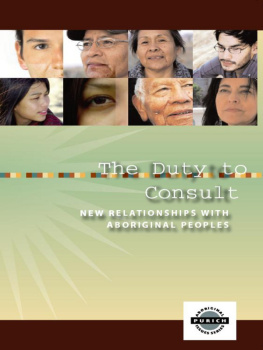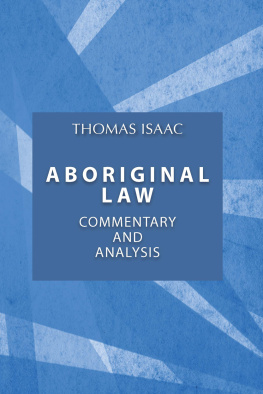
Praise for First Nations? Second Thoughts
Provocative is not a clich when describing this book. Choice
Fascinating, factual, frank. Edmonton Journal
Flanagan literally takes the bull by the horns in his latest offering an excellent read. Alberta Native News
No reader will come away from Tom Flanagans Provocative First Nations? Second Thoughts without some opinion about aboriginal peoples. The Beaver
Tom Flanagan has written an important critique of the aboriginal orthodoxy in Canada. First Nations? Second Thoughts will elicit strong reactions from readers. Perspectives on Political Science
Flanagans arguments are, without question, the most thoughtful and comprehensive of the critiques of aboriginal policy that have been offered so far. His views are controversial and, whether or not you agree with him, there is a clear need for his arguments to be publicly available and debated. Alan Cairns, Faculty of Law, University of British Columbia
Third Edition
First Nations?
Second Thoughts
TOM FLANAGAN
McGill-Queens University Press
Montreal & Kingston London Chicago
McGill-Queens University Press 2019
ISBN 978-0-7735-5853-3 (paper)
ISBN 978-0-7735-5854-0 (ePDF)
ISBN 978-0-7735-5855-7 (ePUB)
Legal deposit fourth quarter 2019
Bibliothque nationale du Qubec
Printed in Canada on acid-free paper that is 100% ancient forest free (100% post-consumer recycled), processed chlorine free
First edition 2000.
We acknowledge the support of the Canada Council for the Arts.
Nous remercions le Conseil des arts du Canada de son soutien.
Canadian Cataloguing in Publication Data
Title: First nations? Second thoughts / Tom Flanagan.
Names: Flanagan, Thomas, 1944 author.
Description: Third edition. | Includes bibliographical references and index.
Identifiers: Canadiana (print) 20190164409 | Canadiana (ebook) 20190164425 | ISBN 9780773558533 (paper) | ISBN 9780773558540 (ePDF) | ISBN 9780773558557 (ePUB)
Subjects: LCSH: Indians of North AmericaCanadaGovernment relations. | LCSH: Indians of North AmericaCanadaPolitics and government. | LCSH: Indians of North AmericaLegal status, laws, etc.Canada.
Classification: LCC E92. F614 2019 | DDC 323.1197/071dc23
Typeset in Sabon 10.5/13
by Infoscan Collette, Quebec
Contents
Preface to the Third Edition
The first edition of this book was a reply to the Report of the Royal Commission on Aboriginal Peoples, released in 1996. The report, commissioned by the Conservative government of Brian Mulroney and received by the Liberal government of Jean Chrtien, led to a lot of public discussion but in the end had little immediate impact on public policy. Prime Minister Chrtien declined to embrace the reports many recommendations, with all the risk and expense they would have entailed. Thus, when a second edition of this book was published, I added a chapter entitled Update 2008, dealing with recent developments in the law, politics, and economics of aboriginal issues. It did not seem necessary to take issue again with the report, which appeared to have come and gone without leaving a major mark on public policy.
How different things look a decade later! The intellectual substance of the report is back, embraced at least rhetorically by the Liberal government of Justin Trudeau that came to power in late 2015. How this happened is an interesting story in itself.
Conservative prime minister Stephen Harper, elected in 2006, had never been known as an advocate for First Nations. But he took a personal interest in the residential schools question and issued a moving apology, accompanied with generous financial compensation for the harm that the schools may have done to those who attended them. Martin Luthers Ninety-Five Theses plunged Europe into two centuries of turmoil and religious warfare; what would these ninety-four recommendations mean for Canada?
In fact, the stagecraft of public announcements proved to be the easy part; the statecraft of fulfilling all those promises has been much more difficult. The government announced that it was adopting the United Nations Declaration on the Rights of Indigenous Peoples, and then the minister of justice explained that parts of UNDRIP were in conflict with the Constitution of Canada and could not be implemented. Bureaucratic reorganization and increased federal spending are not going to make a huge difference to anyone except government employees but thats what happens when you try to realize a utopian vision of Indigenous nationhood and sovereignty.
There remains a place for First Nations? Second Thoughts in public discussion. It is one of the few fundamental challenges to what the book called the aboriginal orthodoxy, now resurgent as official policy of the Liberal government. I thank McGill-Queens University Press for releasing a third edition to make it more available to the public. Once again the press is showing that it does not shy away from publishing politically controversial views.
NOTES
.
.
.
.
.
.
.
Preface to the Second Edition
The first edition of First Nations? Second Thoughts attracted more attention than the usual academic book. Greeted with acclaim in some quarters, it won two prizes in 2001: the Donner Prize for the best book on Canadian public policy, and the Donald Smiley Prize, awarded by the Canadian Political Science Association, for the best book on Canadian politics and government. Fortuitously, my book appeared in the same year as Alan Cairnss fine work Citizens Plus: Aboriginal Peoples and the Canadian State. we both expressed misgivings about the tendency of aboriginal political leaders to emphasize sovereignty over integration into Canadian society. Since some of our ideas were picked up and amplified by journalists and media columnists, they may even have had an effect upon the climate of opinion in Canada.
On the other side, many aboriginal authors and spokesmen vigorously attacked First Nations? Second Thoughts, calling it racist, poorly researched, and out of date. The attacks continued as I went on to spend a few years in politics as campaign manager for Stephen Harper and the Conservative Party of Canada.
Given that the book played a role in public debate, I thought it better not to revise it when Philip Cercone, executive director of McGill-Queens University Press, asked me to consider a second edition. The first edition was a critique of the worldview expressed in the report of the Royal Commission on Aboriginal Peoples and has to be understood in the context of the debate that swirled around that report when it was released in 1996. There is no point in trying to rewrite First Nations? Second Thoughts now that that debate is over. I propose, instead, to leave the first edition unchanged so that readers can see why it was controversial in the context of its day but to add a ten-year update in the form of a new concluding chapter. The first edition was published in 2000, but I did much of the research and writing in 1998, so 2008 is approximately the ten-year anniversary of the work.
Since I first published First Nations? Second Thoughts, other authors have made notable contributions to the critique of aboriginal orthodoxy. Jean Allard, himself a Metis and a former member of Ed Schreyers NDP cabinet in Manitoba, put forward the radical proposal that treaty benefits be commuted into cash payments to individual status Indians to give them more control over their own governments.
Next page
